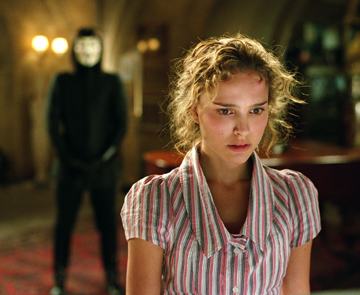 A man in a mask watches over Natalie Portman and the rest of Britain in ‘V for Vendetta.’
A man in a mask watches over Natalie Portman and the rest of Britain in ‘V for Vendetta.’
|
| V for Vendetta\r\nStarring Natalie Portman and Hugo Weaving. Directed by James McTeigue. Written by Larry and Andy Wachowski, based on Alan Moore and David Lloyd’s graphic novel. Rated R. |
|
A D V E R T I S E M E N T
|
|
|
|
A D V E R T I S E M E N T
|
|
Blow-Up
In the end, V for Vendetta is just a thriller, though smarter than most.
By KRISTIAN LIN
V for Vendetta is based on a comic book. Wait, that’s not quite right. The seminal series written by Alan Moore and illustrated by David Lloyd was conceived and published between 1981 and 1988, prophesying a dark direction for England under Mrs. Thatcher. Centered around a knife-wielding, bomb-throwing, freedom fighter (terrorist?) hero, it wove a dense web of political commentary and literary allusions, showed that comics could be the medium for serious artistic statements, and singlehandedly created the entire idea of the “graphic novel.”
The movie rights kicked around Hollywood for about 15 years, and in the interim, real-life terrorists struck New York, Washington, Madrid, and London, the last four months before the film’s originally scheduled release. This would seem to make an inhospitable environment for stories about violently overthrowing governments. Not so; our world leaders’ blundering and blatant power games have sparked a number of sci-fi flicks set in future fascist dictatorships: The Island, Aeon Flux — heck, Ultraviolet is still in the multiplexes. The Hollywood version of V for Vendetta is more convincing than any of those, but it also leaves you wanting more, for several reasons.
It takes place in England about 20 years from now, when America has plunged itself and most of the developed world into ruin. Britain has survived by becoming a dystopian police state that, in the name of national security, indulges in domestic spying, torture, and systematic extermination of blacks, Indians, Irish, Muslims, homosexuals, and any other possible sources of dissent. This future world is seen through the eyes of Evey Hammond (Natalie Portman), a low-level office worker at the nation’s only tv network who one night discovers that the cops who enforce the nighttime curfew would rather rape her than turn her in. She’s rescued by a masked man who calls himself “V” (Hugo Weaving). Disguised as Guy Fawkes, he goes further in identifying with the infamous English traitor by blowing up several London landmarks on Guy Fawkes Day, Nov. 5.
Fresh from The Matrix trilogy, the Wachowski brothers wrote the script, but rather than directing the movie themselves, they tapped their Australian protégé and second-unit director, James McTeigue. The filmmakers wrought some significant and much-needed changes on the graphic novel. (Many aspects of the story that were groundbreaking in the 1980s have lost their shock value, such as the sympathetic depictions of gay characters and the inclusion of a child-molesting bishop among the gallery of villains.) The filmmakers have brought a sense of humor to the material, going so far as to show us V in his kitchen, wearing a frilly apron while preparing eggs Benedict for Evey. Moore’s fans will scream heresy, but if anything, the movie could stand even more levity. The jokes that are here work quite well, especially an interlude in which Evey’s boss (Stephen Fry), a closeted gay tv talk-show host who shelters her, dares to air a comedy sketch that lampoons the government.
The filmmakers also soften the character of V, with much less happy results. The graphic novel’s greatness lies in its moral ambiguity — V really isn’t a hero but a monster who’s only marginally preferable to the politicians he’s busy murdering. Instead of a twisted ideologue who’s doing right in the wrong way, the movie makes him into a sensitive soul who falls in love with Evey. Setting aside the ethical implications of depicting a terrorist thus, the relationship between Evey and V never gains any credibility. They might as well be singing Andrew Lloyd Webber. (You know, “The Phaaaa-ntom of the Opera is here inside my mind.” Seriously, what’s the difference between this movie’s V and Lloyd Webber’s Phantom, besides a few poli-sci classes?) Casting Portman is a smart move, because when one of the lead characters wears a mask for the whole film, the other lead has to do the emoting for both. She’s as tremulous and vulnerable as you could wish, yet for all her efforts the movie’s still largely missing the human element. This is probably why Alan Moore, victimized by Hollywood before, disowned this film and took his name off the credits.
Ah, screw it. I’m not Alan Moore, and the human element isn’t entirely missing here. It’s in Stephen Rea’s watchful, lived-in performance as the Inspector Javert-like cop who doggedly tracks V while dodging the case’s political pitfalls. It’s also in the piercingly sad vignette when Evey is thrown in jail, and the inmate in the next cell (Natasha Wightman as a former movie star imprisoned for being a lesbian) passes her an autobiography scrawled on scraps of toilet paper. These things help put a face on the movie’s political insights, which are sharper than most. V for Vendetta isn’t the momentous masterpiece that the studio and the comic-book fans would want, but it’s a good-looking popcorn flick with enough on its brain to make it worth a viewing.
 Email this Article...
Email this Article...

